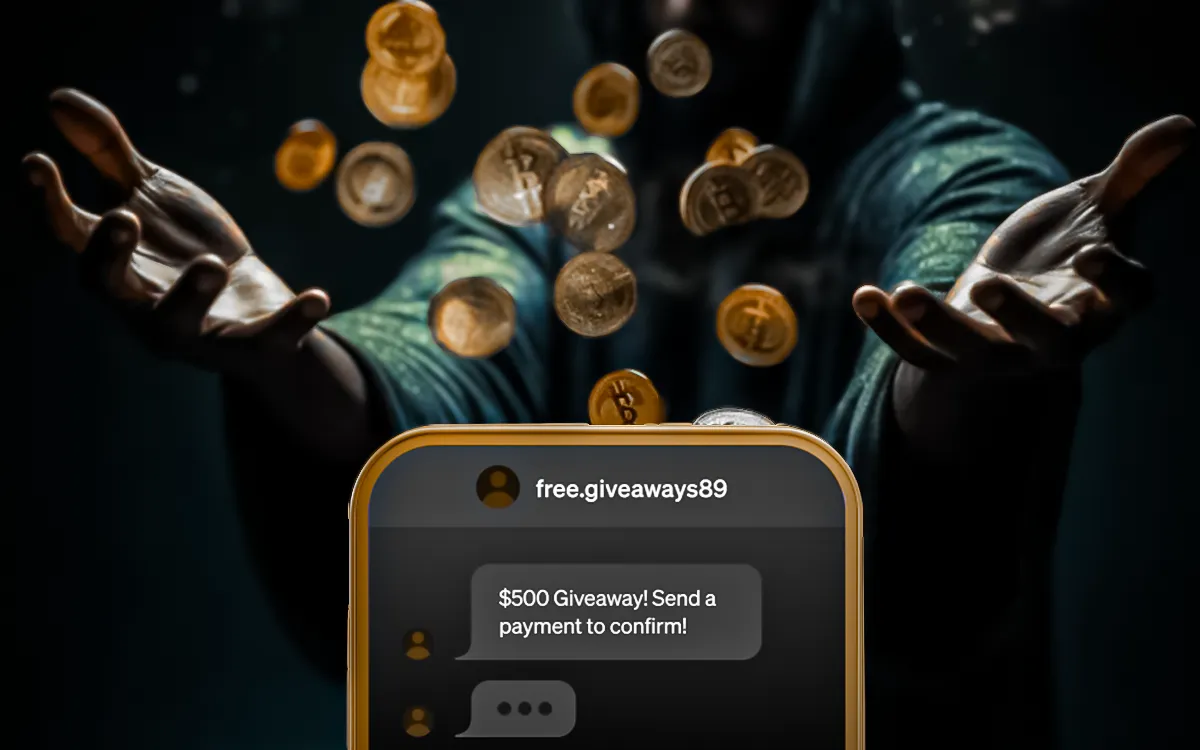
Have you ever seen a post on Twitter, Instagram, or YouTube saying:
‘We’re giving away 5,000 ETH, just send 1 ETH to verify!’
If so, you’re not alone. Thousands of people fall for these crypto giveaway scams each year, tempted by the promise of free cryptocurrency.
In fact, according to Coinbase, these scams often impersonate public figures like Elon Musk, creating a false sense of trust. They copy legitimate promotions but are nothing more than digital traps that steal your crypto the moment you send it.
Moreover, a recent investigation onarXiv found that crypto scammers made over $2.7 million through fake Twitter promotions and another $1.9 million from YouTube livestream scams just by asking victims to “verify” their wallet with a small crypto deposit.
This blog breaks down how crypto giveaway scams work, why they’re so effective, and, most importantly, how to protect yourself from falling into one and also how to recover your lost money.
Table of Contents
Ever seen a post that says, “Send 0.1 BTC and get 0.2 BTC back instantly!”? Sounds tempting, right? That’s the classic setup for a crypto giveaway scam.
In reality, it’s a fraudulent scheme where scammers pose as celebrities, influencers, or crypto companies and claim they’re running a "limited-time crypto giveaway." They promise to double your crypto if you send them a small amount first. But once you send it, your money vanishes, and they’re gone.
These scams are everywhere: Twitter, YouTube live streams, Telegram groups, fake websites, and even in comment sections of real crypto influencers. They often use fake endorsements from people like Elon Musk or companies like Coinbase to build trust fast.
And the worst part? Because blockchain transactions are permanent, once you send your funds to a scammer’s wallet, there’s no refund button.
Scammers know how to play with our emotions: they use FOMO (fear of missing out), urgency, and flashy graphics to make you believe it’s your lucky day. Moreover, it’s easy to fall for something that looks legit, especially if you’re new to crypto trading or Bitcoin investing.
Crypto giveaway scams are planned to look real and push you to act quickly before you can think it through.
Here’s how the scam usually unfolds:
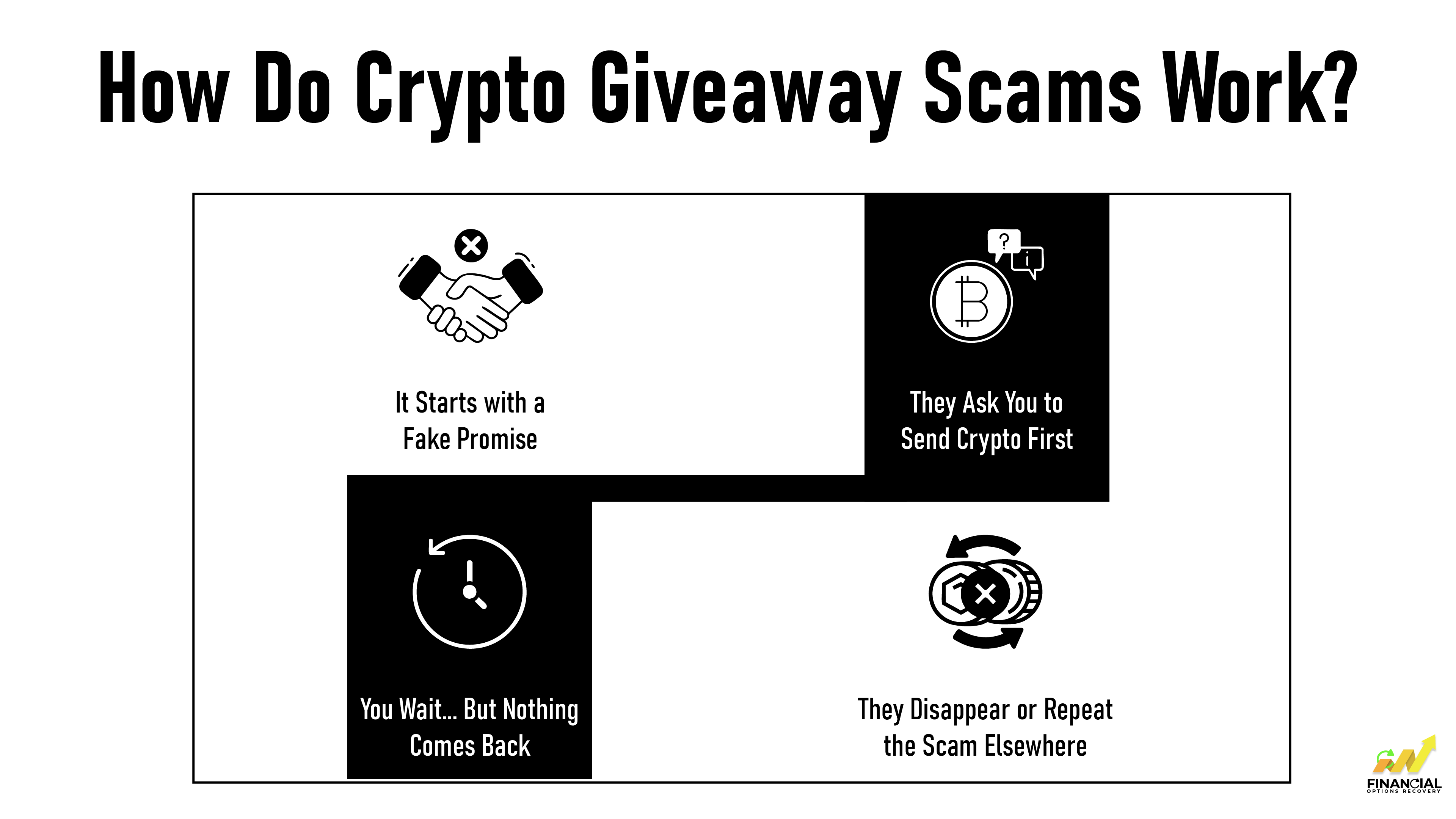
These scams are effective because they exploit trust, urgency, and greed, particularly on social media platformswhere information moves quickly and appears convincing.
Scammers know where the crypto crowd hangs out, and they use it to their advantage. From social platforms to YouTube live streams, impersonation scams have become a massive threat, especially when combined with urgency-driven fake giveaways.
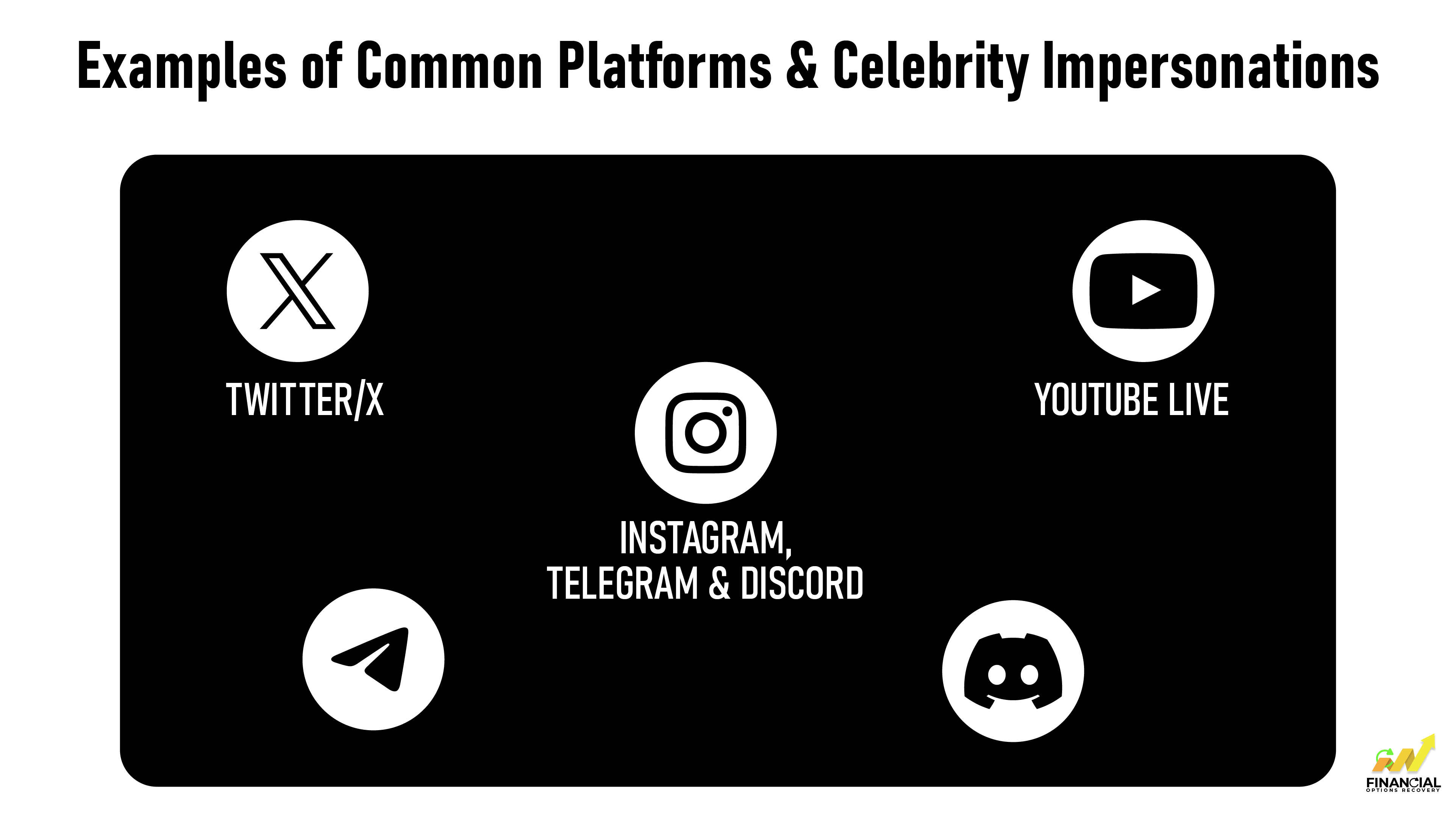
Twitter (now X) is a hotspot for crypto giveaway scams, especially impersonation schemes. Scammers mimic well-known figures like Elon Musk, CZ (Binance CEO), Vitalik Buterin, or major crypto project accounts using nearly identical handles and profile pictures.
They often reply to viral tweets or launch fake “official” promotions, saying:
“Send 0.5 BTC and receive 1 BTC instantly!”
These tweets are usually backed by bot accounts liking and commenting on things like
“It worked for me!” or “Thanks, Elon, just got my free BTC!”
Pro Tip: Verified blue checkmarks are not enough; always double-check usernames and go to the official page manually, not through links.
Another common method is using fake YouTube livestreams featuring celebrities or crypto events. The most infamous example?
In 2020, hackers breached Twitter’s internal tools and used verified accounts of Elon Musk, Apple, Bill Gates, and others to promote a Bitcoin giveaway scam, netting over $100,000 in minutes.
Fake YouTube streams now regularly mimic events from:
These streams display QR codes or URLs, promising instant crypto returns. They’re all fake. The comments and views are usually botted to create false credibility.
While Twitter and YouTube dominate the scene, other platforms are also targeted:
These impersonation scams play on three psychological levers:
Now, let’s understand the red flags to identify a crypto giveaway scam in detail.
|
Red Flag |
What It Means |
|
Too-Good-To-Be-True Offers |
Claims that you’ll double your crypto instantly are a classic crypto scam tactic. |
|
Requests for Upfront Payment |
Real giveaways never ask you to send crypto first. |
|
Fake Celebrity Endorsements |
Impersonation of Elon Musk, Vitalik Buterin, or crypto companies. |
|
Urgency and Countdown Timers |
Scammers push you to act fast before thinking, which is common in giveaway fraud. |
|
Unverified or Suspicious Links |
URLs that look odd or don’t belong to the official website. |
|
No Contact or Support Info |
Legit crypto platforms provide real-time help and transparency. |
|
Copied Profiles & Logos |
Scammers often clone real accounts to build false trust. |
|
Limited-Time Livestreams |
Used on YouTube/Twitter to simulate real-time engagement, but it's all fake. |
Crypto giveaway scams can look incredibly real, especially when they flash big names like Elon Musk or Binance and offer you free crypto just for “verifying your wallet.” But the good news is that once you know what to look for, these scams become much easier to spot.
Here’s how to protect yourself and your crypto from getting snatched.
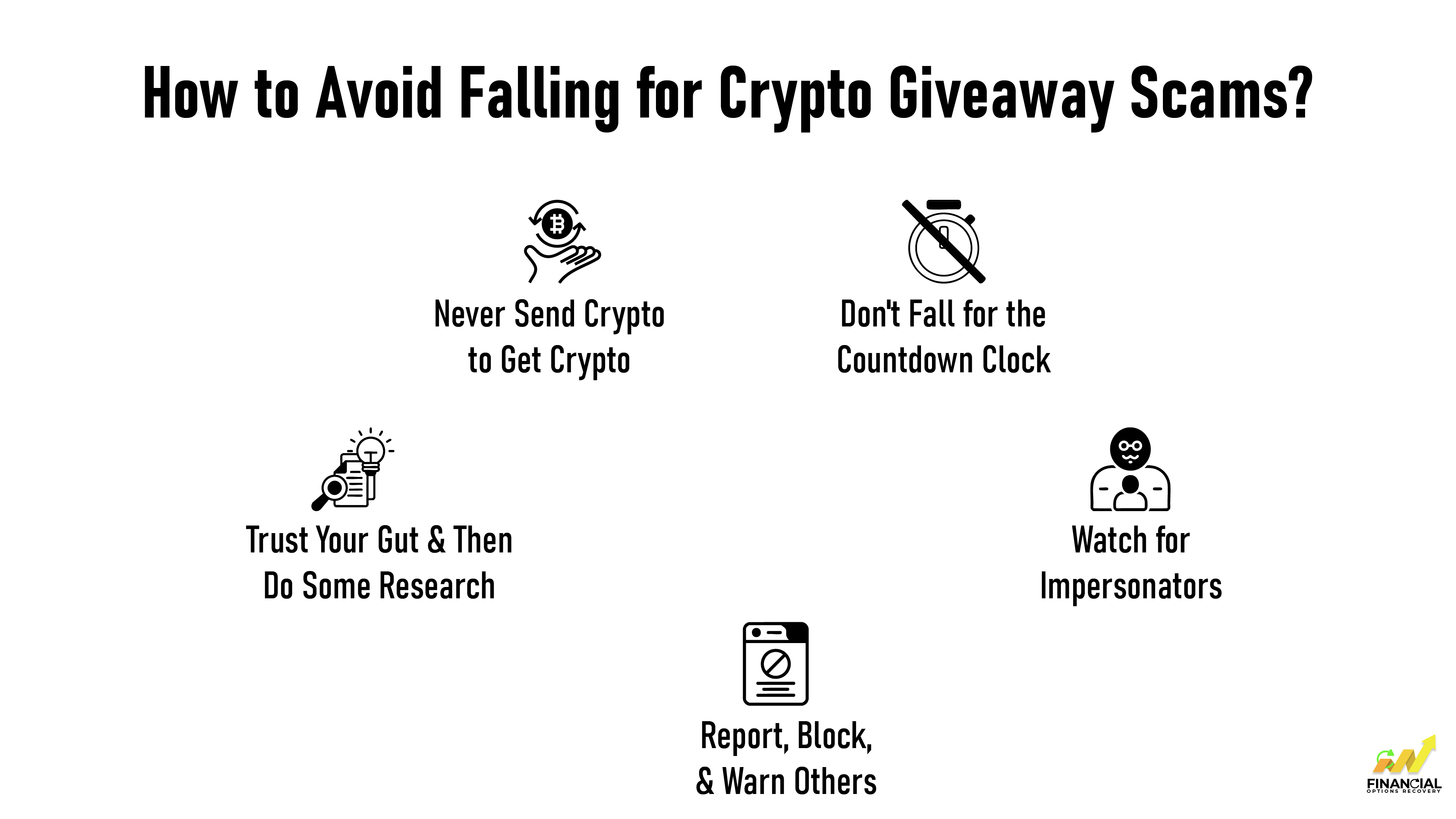
If a giveaway asks you to send crypto first to “receive more,” it’s a 100% scam. Real crypto companies and influencers never ask for deposits to join a giveaway. You wouldn’t pay money to win a prize in real life; the same rule applies here.
Before you get excited, ask yourself, is this giveaway mentioned on the official website or social media page?
Scammers often create fake accounts that look exactly like the real thing; logos, bios, and even that little blue checkmark can be faked.
Tip: Always go directly to the official website (like coinbase.com or binance.com) and check if the giveaway is real. Don’t click random links in comments or DMs.
If it feels rushed or you’re getting FOMO, take a deep breath and walk away.
If something feels off, it probably is. Look for red flags:
Use tools like Whois lookup, Trustpilot, or even a quick Reddit search to see if others have flagged the same giveaway as fake.
Scammers love to impersonate high-profile figures, like Elon Musk, Vitalik Buterin, or popular crypto YouTubers.
They might copy their photos and names and even use bots to flood the comments with fake “success stories.”
But remember: just because it looks legit doesn’t mean it is.
Tip: Click into the profile. Is it new? Does it have weird usernames or follower counts? Does it link to an official site? The devil’s in the details.
If you come across a scammy post, report it immediately on the platform (Twitter/X, YouTube, Instagram). Block the account and, if you can, warn others in the comment section.
The more people report these scams, the harder it becomes for them to spread.
If you’ve been tricked by a crypto giveaway scam, you’re not alone. It happens to thousands of people each year. Scammers act fast and try to make you decide without thinking, but you can still protect yourself and try to get help.
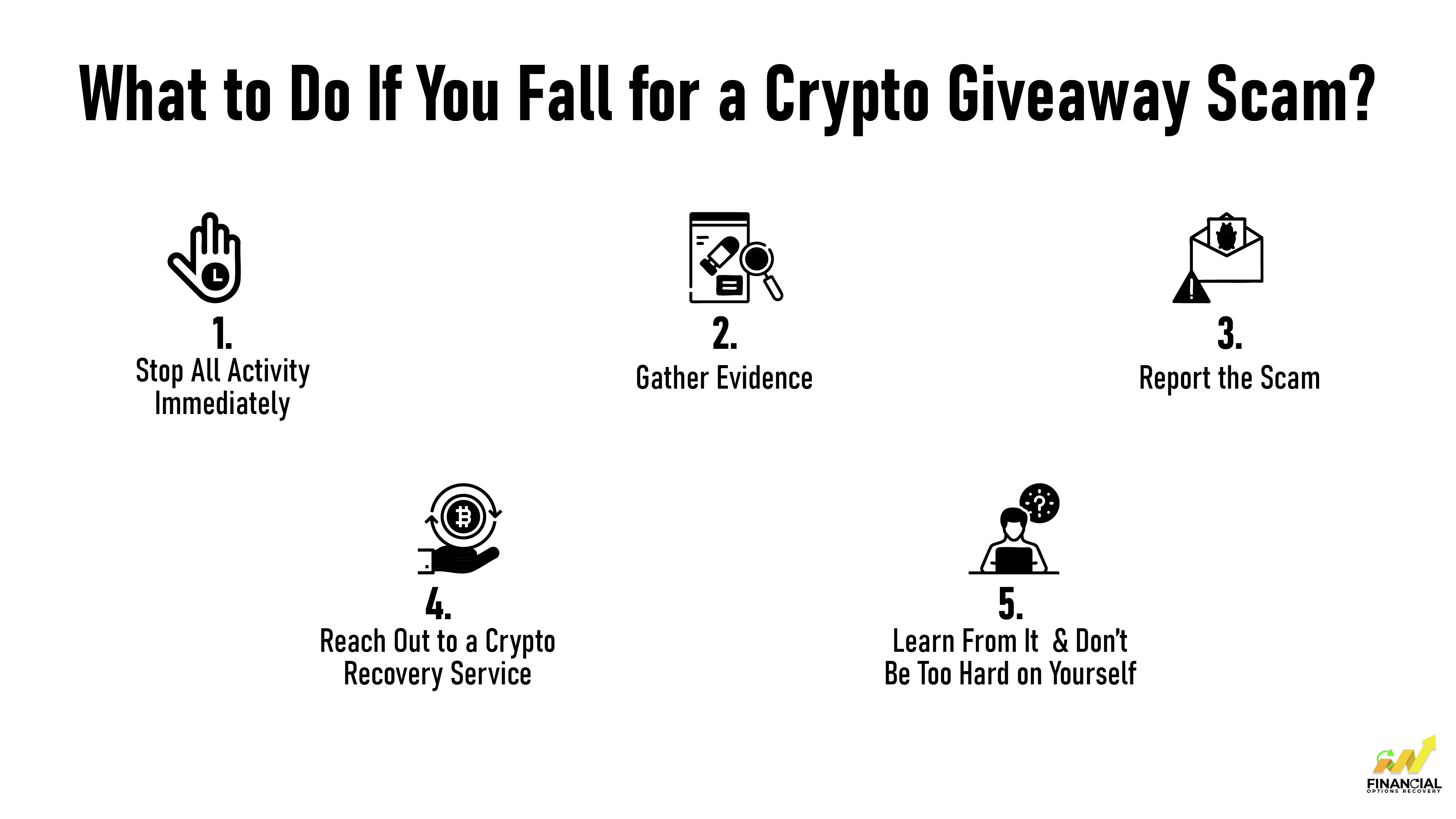
By reading this blog, you’ve already done something many victims of crypto scams haven’t, you’ve taken the time to learn how these scams work and how to protect yourself.
That means you’re now better prepared to:
And if you’ve already been scammed, now you know it’s not the end; it’s the start of a smarter, safer path forward.
If you believe you’ve been a victim of a scam or need help tracing your Bitcoin, don’t hesitate to contact Financial Options Recovery for expert support.
Because scammers constantly evolve their tactics. In 2025, many scams use AI-generated voices, deepfake videos, and fake live streams to mimic real people like Elon Musk or crypto CEOs. They also clone verified-looking social media accounts. These tools make the scam look “too real to doubt,” especially for newer investors or those unfamiliar with blockchain.
Yes, they’re illegal. Crypto fraud falls under cybercrime and financial fraud laws in most countries. The challenge is that scammers often hide behind VPNs and use multiple wallets, making them harder to track. That’s why working with experts who specialize in crypto scam recovery is so crucial.
Yes. These platforms are hot spots for spoofed livestreams, fake comment bots, and clone accounts promoting “double-your-crypto” offers. Avoid giveaways promoted during live chats or in suspicious comment threads, even if the profile looks real.
This is one of the oldest crypto giveaway tricks. Scammers claim that if you send 1 BTC, you'll receive 2 BTC in return. It’s often promoted using fake celebrity endorsements or cloned websites. The truth? Once you send your crypto, it’s gone.
Scammers stream fake SpaceX or Tesla events on YouTube or X (Twitter) using deepfake tech or old videos. During the stream, a “limited-time offer” link appears, claiming to double your ETH or BTC. These impersonation scams have stolen millions from unsuspecting users.